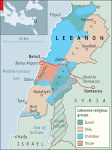Lebanon is facing several critical issues. First, there is a tremendous social and economic crisis in this country, there is a 45 billion dollar debt, one of the largest debts per capita in the world, resulting from over a decade of neo-liberal economic policies that simply didn't work throughout the 1990s.Nicholas Noe, the editor of www.mideastwire.com (worth the subscription) and Voice of Hezbollah: The Statements of Sayyed Hassan Nasrallah, writes in today's New York Times:
In truth there is little opposition towards the economic policies that the government is putting forward, that is to say that the opposition in Lebanon is more or less in agreement with the government in regards to social and economic policy. Both the opposition and the government have attempted to sweep the main social and economic issues facing Lebanon under the carpet. This is one major issue.
Joshua Landis writes in Syria Comment:In the wake of a narrowly averted civil war here last month, the United States now has a unique opportunity to help build something that all the parties to the conflict have said they very much want: a strong Lebanese Armed Forces.
Unfortunately, even though the Bush administration has provided more than $300 million in tactical aid to Lebanon since the Syrian withdrawal of 2005, it still apparently refuses to provide the kind of strategic weapons — guided rockets, tanks, modern artillery and intelligence-gathering equipment — that are desperately needed in this task. During her visit to Beirut this week, Secretary of State Condoleezza Rice didn’t even mention the issue.
The reason for this, American and Lebanese officials say privately, is a longstanding prohibition against supplying Lebanese forces with advanced equipment that could be used against Israel.
This “red line” remains even though Hezbollah has far more dangerous weaponry, and despite Washington’s commitment to build up the authority of the state. It is a testament to how short-sighted and contradictory the American approach to Lebanon has been.
The US and France are struggling to find a common post-Doha policy on Hizbullah and Syria. France is exploiting the appointment of President Michel Suleiman to rehabilitate relations with Syria, which have been in the dumps since 2005. Washington is not happy with the Franco-Syrian honeymoon. This comes as little surprise, for it marks the failure of Washington's Lebanon policy. President Bush wanted to wrest Lebanon from Syria's sphere of influence as part of an over-arching effort to reform the Greater Middle East. It should be stated that Washington succeeded in driving Syria's military out of Lebanon in 2005. But far from being able to accept this as a victory, President Bush stubbornly insisted on eradicating every expression of Syrian influence from its smaller and divided neighbor - a policy which seemed as unwise as it was unrealizable.The Wall Street Journal on Barack Obama's Middle East advisers:
In fine-tuning his foreign-policy agenda, Barack Obama is turning to a core group of Middle East experts who have spent more than a decade, in Democratic and Republican administrations, exploring avenues to engaging Iran and Syria.And finally, the Daily Star prints "total bullshit."Chief among them are Dennis Ross, former President Clinton's lead Mideast negotiator; James Steinberg, a deputy national-security adviser under Mr. Clinton; and Daniel Kurtzer, a career diplomat who developed Mideast policy under President Bush and his father.
Some of these experts, such as Messrs. Ross and Steinberg, don't describe themselves as formally part of Sen. Obama's campaign for president. But their involvement illustrates the increasing influence on Sen. Obama's thinking of some of the Democratic Party's foreign-policy veterans, now that the long nominating process is over.These three men were among the principal authors of Sen. Obama's speech this month on the Middle East before a pro-Israel lobbying group, according to the Obama campaign. The speech was viewed as the candidate's most expansive yet on international affairs. The U.S. senator from Illinois pledged during the address to break from the Bush administration and explore high-level engagements with Iran and Syria in a bid to stabilize Iraq and the broader Middle East.
In interviews, these strategists describe a campaign that sees potential diplomatic openings in the Middle East should Sen. Obama be elected in November and begin pulling U.S. combat troops out of Iraq. But they also acknowledged that there are real lessons to be learned from previous U.S. efforts to engage Tehran and Damascus, during the 1990s, which drew mixed results.
Sen. Obama's philosophy is that you "approach the world, and you approach it through engagement: You shore up alliances, and you engage with enemies," said Mr. Kurtzer, who served as the U.S. ambassador to Israel from 2001 to 2005. "But occasionally you have to hit them, too."

